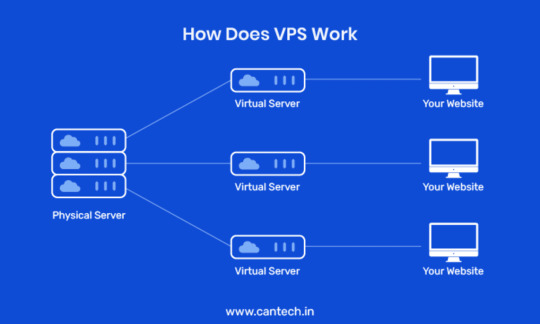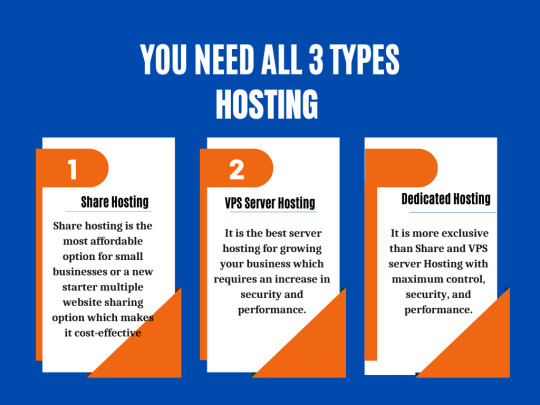#How Does Vps Hosting Work
Explore tagged Tumblr posts
Text
Unchain Your Website's Potential: The Ultimate Guide to VPS Hosting!

Is your website sluggish, unreliable, and constantly battling for resources? Shared hosting might have been a lifesaver when you were starting out, but now it's holding you back. Upgrading to a Virtual Private Server (VPS) can be the game-changer you need. But what exactly is a VPS, and how can it unleash your website's true potential?
This comprehensive guide dives deep into the world of VPS hosting, explaining how it works, its benefits for tasks like Forex trading, and the key factors to consider when choosing the perfect plan for your needs. We'll even show you how to navigate the setup process and unlock the power of your VPS with tools like Remote Desktop Protocol (RDP).
By the end of this article, you'll be armed with the knowledge to confidently choose a reliable VPS hosting provider like Data Base Mart and propel your website or application to new heights of performance and security.
Unveiling the VPS: How It Works
Imagine a high-rise apartment building. The entire building represents a physical server owned by a hosting provider. Now, imagine dividing each floor into individual, self-contained units. These units are your VPS!
VPS hosting leverages virtualization technology to carve a single physical server into multiple virtual ones. Each VPS functions like a dedicated server, with its own operating system, software, and allocated resources like CPU, memory, and storage. This isolation ensures your website or application enjoys a stable environment, unaffected by activity on other virtual servers sharing the physical machine.
How VPS Hosting Works
VPS hosting builds upon the core principle explained above. Hosting providers like Data Base Mart offer various VPS plans with different resource allocations. You choose a plan that aligns with your needs and budget. The provider then sets up your virtual server on their physical infrastructure, granting you root access for complete control and customization.
Powering Forex Trading with VPS
Foreign exchange (Forex) trading thrives on speed and reliability. A VPS ensures uninterrupted access to the market, even during peak trading hours. With a VPS, you can run trading bots and automated strategies 24/7 without worrying about downtime caused by shared hosting issues.
Choosing the Right VPS
Selecting the ideal VPS hinges on your specific needs. Here's a breakdown of key factors to consider:
Resource Requirements: Evaluate your CPU, memory, and storage needs based on the website or application you'll be running.
Operating System: Choose a provider offering the operating system you're comfortable with, such as Linux or Windows.
Managed vs. Unmanaged: Managed VPS plans include maintenance and support, while unmanaged plans require you to handle server administration.
Scalability: If you anticipate future growth, choose a provider that allows easy scaling of your VPS resources.
How to Use VPS with Remote Desktop Protocol (RDP)
Many VPS providers offer remote access via RDP, a graphical interface that lets you manage your server from a remote computer. This is particularly useful for installing software, configuring settings, and troubleshooting issues.
Creating a VPS Account
The signup process for a VPS account is straightforward. Head to your chosen provider's website, select a plan, and follow the on-screen instructions. They'll typically guide you through the account creation and server setup process.
VPS Pricing
VPS plans are generally more expensive than shared hosting but significantly cheaper than dedicated servers. Pricing varies based on resource allocation and features. Providers like Data Base Mart offer competitive rates for reliable VPS solutions.
VPS Terminology Explained
VPS Stands For: Virtual Private Server
VPS Airport (doesn't exist): VPS is not an airport code.
VPS in Basketball (doesn't exist): VPS has no meaning specific to basketball.
VPS Hosting: As explained earlier, refers to a hosting service that provides virtual private servers.
VPS in Business: In a business context, VPS can refer to a virtual private server used for web hosting, application deployment, or other IT needs.
VPS in School (uncommon): While uncommon, schools might use VPS for specific applications requiring a dedicated server environment.
Final Thoughts
VPS offers a compelling middle ground between shared hosting and dedicated servers. It provides the power and control of a dedicated server at a fraction of the cost. By understanding how VPS works and choosing the right plan, you can unlock a secure and reliable platform for your website, application, or even Forex trading needs.
#How Do Vps Work#How Does Vps Work#How Does Vps Work In Forex Trading#How Does Vps Hosting Work#How Are Vps Chosen#How To Vps Rdp#How To Vps Account#How To Vps Price#What Does Vps Stand For#What Does Vps Airport Stand For#What Does Vps Mean In Basketball#What Does Vps Hosting Mean#What Does Vps Stand For In Business#What Does Vps Stand For In School#How Much Does Vps Cost
2 notes
·
View notes
Text
Pick-A-Child Star: Inner Child Messages
In honor of Black History Month, I am continuing the series of highlighting Black icons while prioritizing the spiritual needs of Black Americans. Pick the image that resonates with you most.
Left-to-Right (1-3): Keke Palmer, Aleisha Allen, China Anne McClain



If you chose Pile One, you resonate with the energy of Keke Palmer. As we all know, she is a multi-talented human being. She is a singer-songwriter, actress, dancer, talk show host, podcaster and model. Her name is synonymous with the phrase 'busy bee'. Her infectious personality has followed us through movies and tv shows like True Jackson VP, Scream Queens, Akeelah and the Bee, Nope and much more. She continues to grace the screens with her charismatic nature.
"You're always wondering what you're not, can't you be happy with what you've got?"
When you were younger, you may have watched the tv show, 'How to Rock', starring Cymphonique. The premise of the show is navigating the social castes of high school. I channeled the theme song for this show. You really need to show some more gratitude, man. What's in your imagination is being reflected on the outside world; just enjoy the moment. Your brain is on overload all the time and you really need to rest. On Valentine's Day, you should give yourself some 'me time'. Another message that I get from your inner child is that you need to go play! For some of you, I sense that you're reluctant to let someone into your life when they have good intentions. I think high school plays a big role into why you navigate the world the way that you do. You are not in high school anymore! You are officially responsible for your own shit (that means the emotional trauma too, boo). Your inner child also wants you to know that you should take up some karate/self-defense classes. It is imperative that you learn how to stick up for yourself physically, not just verbally. Lastly, if you have lost a father figure, you should do that thing to honor his legacy such as getting a tattoo of him, getting a portrait painted of him, starting that company and naming it after him. You are your father's offspring, you know?
If you chose pile 2, this means you resonate with the energy of Aleisha Allen. She is most famously known for her roles in the 'Are We There Yet?' film series and School of Rock. Her cheeky portrayal of these characters solidified her as a Black child star icon. After starring in these classic films, she took on smaller roles in 'The Electric Company' and indie films. Since then, she has acquired a Bachelor's degree at Pace University and a Master's degree at Columbia University in Communication Science and Disorders to fulfill a career as a speech pathologist.
“I gets down, I don’t play”
Some of you may be in the midst of choosing a major after being undecided for so long. Some of you may switch majors a lot. Your inner child wants you to choose something that makes them come alive this time. In other words, choose a career path that's not boring to you. You could have ADHD/ADD or some type of learning disability. You need to slow down because you’re inviting some disingenuous energy. Your inner child does not trust the people that are around you. Your light shines too bright to be staying in spaces where you're not celebrated. This made me think of a video of Megan Thee Stallion talking about walking out of rooms where you don't feel comfortable. Do exactly that, my love. Everything will work out just fine if you believe that it will. Your inner child wants you to be as optimistic about this transition as possible. And lastly, you don't have to tolerate anyone's behavior, or quite frankly anything. If you feel like you have to put up with someone's bull, then you need to leave. You guys were quite the sassy kids, weren't you? Now, where did all of that energy go? Why are you dimming yourself down just to appeal to others? It doesn't matter if you're in a corporate meeting or a classroom filled with white people, you speak your mind. You know what's going on, don't be intimidated.
If you chose Pile 3, you resonate with the energy of China Anne McClain. She is known for her roles in Daddy’s Little Girls, A.N.T. Farm, the Descendants series and Black Lightning. Her range in roles highlights her witty, yet dramatic personality, which is the reason for any drawn interest in her. She is also a singer-songwriter who was once in a girl group with her older sisters, Lauryn and Sierra. Since then, she has documented her spiritual journey on social media after quitting acting.
“I’ve got friends on the other side”
This is the pile that I would probably choose. This is the pile of the hoodoos/witches/spiritualists/occultists. Your inner child wants you to know that the spells you’ve been casting have been working. As a child, you may have had some experiences with ghosts/spirits. Nobody believed you but who cares? They’re your friends now. There may be a cousin that you haven’t seen/talked to in a while. Please talk to them! Your inner child misses them so much! It doesn’t matter if you’re not on good terms with them, please go do it. For some reason, you should go play hide and seek. This could also mean that you should prepare for an item of yours to go missing temporarily. It could also mean that you will find out some information that you’ve been searching for. Finally, if you feel like you have nowhere to go, think again! Your inner child wants to go to place where you once frequented. This could be the beach, an arcade or the park. Go have a picnic. Go insert those coins/swipe that card into your favorite apocalypse game. Go dig your toes into the sand! You are going through self-actualization and it is important that you stay grounded. Be prepared to step into uncomfortable positions. Connecting with your inner child is a way to do so. It is essential for your growth as a person.
#law of assumption#manifesting#neville goddard#hoodoo#tarot#tarotreading#astro notes#pick a card#pac reading#pick a pile#divination#pick an image#spirituality#tarot deck#tarotcommunity
170 notes
·
View notes
Text
What is Web Hosting? Discover Types, Key Factors, & 2024’s 12 Best Web Hosting Platforms.
Web hosting—the physical presence of your website on the internet—is essential for your online business. Without dependable web hosting, you jeopardize your capacity to run your business and meet your consumers’ expectations.
Understanding web hosting and how it works can be difficult, particularly for people who are unfamiliar with the notion. This article will clearly describe web hosting, explain the many types of web hosting plans available, and outline the essential factors to consider when selecting a hosting company.
What is web hosting?

Web hosting uses internet-facing hardware and software to provide web services to end users. It is where your website and services are stored, processed, and delivered.
At its most fundamental, web hosting consists of secure internet interfaces and communications, computer server hardware and storage, web server software, and content (text, pictures, audio/video).
However, most web hosting solutions also include database servers, content management systems, e-commerce tools, security and authentication, and other applications required for websites to function and remain secure.
The web hosting sector is critical and is expected to increase by more than 20% year between 2024 and 2028.
How much does web hosting cost?
Hosting charges vary, typically based on capabilities. You may pay $10 per month for a simple billboard-style website to market your business online, or much more if you run a successful e-commerce store with thousands of clients.
To successfully select web hosting that works for you, you simply need to understand your goals and how to translate them into hosting requirements.
Types of Web Hosting
Shared hosting.
Dedicated Hosting
VPS (Virtual Private Server) hosting
Cloud hosting
Continue Reading The Blog Post Click Here...
#Web Hosting#Hosting#WordPress Hosting#WP Hosting#Best Web Hosting#Web Hosting Platforms#Top 12 Web Hosting
7 notes
·
View notes
Text
Understanding Cloud VPS: How It Differs from Traditional VPS Hosting
As online presence has become important, determining which hosting service to choose has become one of the essential business decisions. There are two well-known options: Cloud VPS and Traditional VPS, and each has distinct characteristics and benefits. Understanding their differences can help you choose the hosting solution that has all the features you want for your website. Let us explore the distinction between Cloud VPS and Traditional VPS hosting.

VPS Hosting: The Building Block
Practically, VPS hosting is a reality of virtualization technology, and it includes the segmentation of a physical server into several virtual areas. Each VPS works as stand-alone units, providing users with distinct and reserved assets, greater governance, as well as enhanced security as compared to sharing resources with others (like in shared hosting). This type of unit is perfect for those who want more than shared hosting, but do not wish to have a dedicated server.
Traditional VPS Hosting: What to Expect
An underlying issue with Traditional VPS hosting is that a physical server hosts several distinct virtual servers which are partitions of the single physical server. Individual computational units, such as CPU and memory resource denominating units, are assigned to every partition (virtual server instance) separately.
Benefits of Traditional VPS:
Allocated Resources: Each Virtual Private Server has been allocated dedicated assets alone and hence given room for performance stability.
Steady Environment: All available resources for the servers or applications are set, hence high reliability in performance.
Increased Security: Geo-segmentation of virtual servers result in the captivity of data to determined borders hence more security.
Disadvantages of Traditional VPS:
Potential Growth is Lower: Moving to a new server is often required because scaling specially target resources at taking out the entire current server.
Singe Instance of Trouble: At the incident of some hardware fault on the server all VPS (virtual private servers) instances that were hosted there are affected.
Static Division of Resources: Adjustment on the availability of certain resources at any one time is difficult hence, may cause frustrations in the management of traffic surges.
Cloud VPS Hosting: The Adaptable Approach
Cloud VPS hosting employs a cloud based virtualization technology that allows connection of several servers over a network cloud. Such a structure cultivates flexibility, quick growth and more strength since resources are sourced from several servers rather than one.
Cloud VPS benefits:
Scalable with ease: Resources are completely adjustable and scaling does not involve any upgrades.
Reduced Downtime: The chances of a server going down are drastically reduced because the workload is handled by multiple servers.
Improved Performance Levels: Traffic across servers is balanced to achieve efficiency and a rush is experienced even when the level of activity is busy.
Pay Per Use: The per minute charge system means that costs only increase when the resources increase.
Cloud VPS disadvantages:
Unstable Prices: Servers that bill based on resources consumed means the expense for that month can be somewhat erratic.
Location Issues: This can be a contentious issue due to the fact that all data is kept distributed over many servers in some heavily regulated industries.
Network Dependency: Understandably, the performance of Cloud based VPS is determined by the Internet connection quality; slower networks tend to hamper the speed at which the resources are accessed.
4. Which VPS Option is Right for You?
Choose Traditional VPS if:
You are looking to operate in a more stable and consistent environment.
Your website experiences traffic that is steady and within reasonable limits.
You would like to pay a fixed monthly fee without any variations.
Choose Cloud VPS if:
You are looking for more flexibility and expansion options.
Your site receives fluctuating and irregular visits, or seasonal peaks.
It is essential for your organization to experience high availability and low downtime.
5. Final Thoughts
There are benefits as well as different uses associated with Cloud VPS and Traditional VPS. For example, Cloud VPS offers agility, growth potential, and dependability and is therefore suitable for businesses that are poised for expansion and need to cope with abrupt increases in demand for the products marketed online. On the other hand, Traditional VPS is a great and affordable option for people seeking a certain fixed resource and where variability is not a major factor.
Remember that it is crucial to choose the right type of VPS when starting a website. The difference in performance, online presence, and cost can be widely affected by the host one chooses, making it imperative to adapt the virtual private servers to the needs of the business.
4 notes
·
View notes
Text
How Does VPS Hosting Works?

VPS hosting divides a powerful physical server into multiple virtual servers. This gives you exclusive access to your own dedicated resources (CPU, RAM, and disk space), providing greater control and flexibility than shared hosting. With root or admin access, you can customize your server environment, install software, and optimize performance to fit your specific website or application needs.
2 notes
·
View notes
Text
What Is Linux Web Hosting? A Beginner's Guide
In the ever-evolving digital landscape, the choice of web hosting can significantly impact your online presence. One of the most popular options available is Linux web hosting. But what exactly does it entail, and why is it so widely preferred? This beginner’s guide aims to demystify Linux web hosting, its features, benefits, and how it stands against other hosting types.
Introduction to Web Hosting
Web hosting is a fundamental service that enables individuals and organisations to make their websites accessible on the internet. When you create a website, it consists of numerous files, such as HTML, images, and databases, which need to be stored on a server. A web host provides the server space and connectivity required for these files to be accessed by users online.
There are several types of web hosting, each designed to cater to different needs and budgets. Shared hosting is a cost-effective option where multiple websites share the same server resources. Virtual Private Server (VPS) hosting offers a middle ground, providing dedicated portions of a server for greater performance and control. Dedicated hosting provides an entire server exclusively for one website, ensuring maximum performance but at a higher cost. Cloud hosting uses multiple servers to balance the load and maximise uptime, offering a scalable solution for growing websites.
Web hosting services also include various features to enhance the performance and security of your website. These can range from basic offerings like email accounts and website builders to more advanced features like SSL certificates, automated backups, and DDoS protection. The choice of web hosting can significantly influence your website’s speed, security, and reliability, making it crucial to choose a solution that aligns with your specific requirements.
Understanding the different types of web hosting and the features they offer can help you make an informed decision that suits your needs. Whether you are running a personal blog, a small business website, or a large e-commerce platform, selecting the right web hosting service is a critical step in establishing a successful online presence.
What Is Linux Web Hosting?
Linux web hosting is a type of web hosting service that utilises the Linux operating system to manage and serve websites. Renowned for its open-source nature, Linux provides a stable and secure platform that supports a wide array of programming languages and databases, making it a favoured choice amongst developers and businesses. This hosting environment typically includes support for popular technologies such as Apache web servers, MySQL databases, and PHP scripting, which are integral to modern website development.
One of the distinguishing features of Linux web hosting is its cost-effectiveness. As an open-source system, Linux eliminates the need for costly licensing fees associated with proprietary software, thereby reducing overall hosting expenses. This makes it an attractive option for individuals and organisations operating on a budget.
Moreover, Linux is celebrated for its robust performance and high stability. Websites hosted on Linux servers experience less downtime and faster loading times, which are critical factors for maintaining user engagement and search engine rankings. The operating system’s extensive community of developers continuously works on updates and improvements, ensuring that Linux remains a cutting-edge choice for web hosting.
Linux web hosting also offers considerable flexibility and customisation options. Users have the freedom to configure their hosting environment to meet specific needs, whether they are running simple static websites or complex dynamic applications. This versatility extends to compatibility with various content management systems (CMS) like WordPress, Joomla, and Drupal, which often perform optimally on Linux servers.
In summary, Linux web hosting provides a reliable, secure, and cost-effective solution that caters to a diverse range of web hosting requirements. Its compatibility with essential web technologies and its inherent flexibility make it a preferred choice for many web developers and site owners.
Key Benefits of Linux Web Hosting
Linux web hosting offers several compelling advantages that contribute to its widespread adoption. One of its primary benefits is cost-effectiveness. The open-source nature of Linux eliminates the need for expensive licensing fees, allowing users to allocate their resources more efficiently. This makes it an ideal choice for individuals and organisations with budget constraints. Additionally, Linux is celebrated for its high stability and robust performance. Websites hosted on Linux servers often experience minimal downtime and faster loading speeds, which are essential for maintaining user engagement and achieving favourable search engine rankings.
Another significant benefit is the extensive community support that comes with Linux. The active community of developers and enthusiasts continuously works on updates, patches, and security enhancements, ensuring that Linux remains a secure and reliable platform for web hosting. This ongoing development also means that any issues or vulnerabilities are promptly addressed, offering peace of mind for website owners.
Flexibility is another key advantage of Linux web hosting. The operating system supports a wide range of programming languages, including PHP, Python, and Ruby, making it suitable for various types of web applications. Additionally, Linux servers are highly customisable, allowing users to configure their environment to meet specific needs, whether they are running simple static sites or complex dynamic applications.
Moreover, Linux web hosting is highly compatible with popular content management systems (CMS) like WordPress, Joomla, and Drupal. This compatibility ensures that users can easily deploy and manage their websites using these platforms, benefiting from their extensive plugin and theme ecosystems.
Lastly, Linux's superior security features are worth noting. The operating system is inherently secure and offers various built-in security measures. When combined with best practices such as regular updates and strong passwords, Linux web hosting provides a highly secure environment for any website.
Understanding Linux Distributions in Web Hosting
Linux comes in a variety of distributions, each tailored to meet specific needs and preferences. Among the most popular for web hosting are Ubuntu, CentOS, and Debian. Ubuntu is celebrated for its ease of use and extensive community support, making it a great choice for those new to Linux. CentOS, a favourite in enterprise environments, offers impressive stability and long-term support, which ensures a dependable hosting experience. Debian stands out with its robust package management system and commitment to open-source principles, providing a reliable and secure foundation.
Each distribution brings its own strengths to the table. For example, Ubuntu’s frequent updates ensure access to the latest features and security patches, while CentOS’s extended support cycles make it a solid choice for those requiring a stable, long-term hosting environment. Debian’s extensive repository of packages and minimalistic approach offers flexibility and customisation, catering to the needs of experienced users.
Selecting the right Linux distribution largely depends on your specific requirements and technical expertise. If you prioritise user-friendliness and a wealth of resources for troubleshooting, Ubuntu might be the ideal pick. On the other hand, if you need a rock-solid, stable platform for an enterprise-level application, CentOS could be more appropriate. For those seeking maximum control and a commitment to open-source principles, Debian is a compelling option.
Ultimately, understanding the nuances of these distributions will enable you to choose a Linux environment that aligns with your web hosting needs, ensuring optimal performance and reliability.
Linux Hosting vs Windows Hosting: A Comparative Analysis
When evaluating Linux hosting against Windows hosting, several critical factors come into play. Cost is a significant differentiator; Linux hosting is generally more affordable due to its open-source nature, which eliminates the need for expensive licensing fees. In contrast, Windows hosting often incurs additional costs related to proprietary software licenses.
Compatibility is another important aspect to consider. Linux hosting is renowned for its compatibility with a broad array of open-source software and applications, including popular content management systems like WordPress, Joomla, and Magento. These platforms typically perform better on Linux servers due to optimised server configurations. On the other hand, Windows hosting is the go-to option for websites that rely on Microsoft-specific technologies such as ASP.NET, MSSQL, and other .NET frameworks.
Performance and stability are also crucial elements in this comparison. Linux hosting often provides superior uptime and faster loading speeds due to the lightweight nature of the Linux operating system. The robust performance of Linux servers is further enhanced by the active community that continuously works on optimisations and security patches. Windows hosting, while also reliable, can sometimes be more resource-intensive, potentially affecting performance.
Customisation and control levels differ significantly between the two. Linux offers greater flexibility and customisation options, allowing users to tweak server settings and configurations extensively. This level of control is particularly beneficial for developers who need a tailored hosting environment. Conversely, Windows hosting is typically easier to manage for those familiar with the Windows operating system but may offer less flexibility in terms of customisation.
Security measures also vary between Linux and Windows hosting. Linux is often praised for its strong security features, which are bolstered by a large community dedicated to promptly addressing vulnerabilities. While Windows hosting is secure, it may require more frequent updates and maintenance to ensure the same level of protection.
Common Use Cases for Linux Web Hosting
Linux web hosting is versatile and caters to a broad range of applications, making it a popular choice across various sectors. One of the most common use cases is hosting blogs and personal websites, particularly those built on platforms like WordPress. The open-source nature of Linux and its compatibility with PHP make it an ideal environment for WordPress, which powers a significant portion of the web.
E-commerce websites also benefit greatly from Linux web hosting. Solutions like Magento, PrestaShop, and OpenCart often perform better on Linux servers due to their need for a robust, secure, and scalable hosting environment. The flexibility to configure server settings allows online store owners to optimise performance and ensure a smooth shopping experience for their customers.
Content Management Systems (CMS) such as Joomla and Drupal are another prime use case. These systems require reliable and flexible hosting solutions to manage complex websites with large amounts of content. Linux's support for various databases and scripting languages ensures seamless integration and optimal performance for CMS-based sites.
Developers frequently turn to Linux web hosting for custom web applications. The operating system supports a variety of programming languages, including Python, Ruby, and Perl, making it suitable for a wide array of development projects. Its command-line interface and extensive package repositories allow developers to install and manage software efficiently.
Additionally, Linux web hosting is commonly used for educational and non-profit websites. The low cost and high reliability make it a practical choice for schools, universities, and charitable organisations that need a dependable online presence without breaking the bank.
Setting Up a Linux Web Hosting Environment
Setting up a Linux web hosting environment can be straightforward with the right approach. Begin by selecting a reputable hosting provider that offers Linux-based plans. After signing up, you'll typically be granted access to a control panel, such as cPanel or Plesk, which simplifies the management of your hosting environment. Through the control panel, you can manage files, databases, email accounts, and more.
Next, if you're using a content management system (CMS) like WordPress, Joomla, or Drupal, you can often find one-click installation options within the control panel. This feature makes it easy to get your website up and running quickly. Additionally, ensure that you configure your domain name to point to your new hosting server, which usually involves updating your domain's DNS settings.
For those who prefer more control or are comfortable using the command line, you can manually set up your web server using SSH access. This method allows you to install and configure web server software like Apache or Nginx, as well as databases such as MySQL or PostgreSQL.
Regardless of the setup method you choose, it's crucial to secure your server from the outset. This includes setting up a firewall, enabling SSH key authentication for secure access, and regularly updating all software to protect against vulnerabilities. Regularly monitoring your server's performance and security logs can help you stay ahead of potential issues, ensuring a stable and secure hosting environment for your website.
Security Best Practices for Linux Web Hosting
Securing your Linux web hosting environment is paramount to safeguarding your website against potential threats. Begin by ensuring your server software and all installed applications are up to date. Regular updates often include patches for security vulnerabilities, making this a critical step. Utilise strong, unique passwords for all user accounts, and consider employing SSH key authentication for added security when accessing your server remotely.
Setting up a firewall is another essential measure. Tools like iptables or firewalld can help you configure firewall rules to control incoming and outgoing traffic, thereby reducing the risk of unauthorised access. Implementing intrusion detection systems (IDS), such as Fail2Ban, can provide an additional layer of security by monitoring and blocking suspicious activities.
Consider deploying an SSL certificate to encrypt data transmitted between your server and users' browsers. This not only enhances security but also boosts user trust and can improve your search engine rankings. Additionally, limit the use of root privileges; create separate user accounts with the necessary permissions to minimise potential damage in the event of a breach.
Regularly backup your data to mitigate the impact of data loss due to hardware failure, cyber-attacks, or human error. Automated backup solutions can simplify this process, ensuring your data is consistently protected. Monitoring your server's logs can also be invaluable for identifying unusual activity early. Tools like Logwatch or the ELK Stack can assist in log management and analysis, enabling you to take swift action if anomalies are detected.
Common Challenges and How to Overcome Them
Setting up and maintaining a Linux web hosting environment can present various challenges, especially for those new to the platform. One frequent issue is navigating the command line, which can be daunting for beginners. Engaging with online tutorials, forums, and communities like Stack Overflow can be invaluable for learning the basics and troubleshooting problems. Another common challenge is software incompatibility. Ensuring your web applications are compatible with the Linux distribution you choose is crucial; consulting documentation and support resources can help mitigate these issues.
Security configuration can also be a complex task. Implementing best practices such as setting up firewalls, regular updates, and using strong authentication methods requires a good understanding of Linux security principles. Managed hosting services can offer a solution here by handling these technical aspects for you, allowing you to focus on your website content.
Resource management is another area where users might struggle. Monitoring server performance and managing resources effectively ensures your website runs smoothly. Utilising monitoring tools and performance optimisation techniques can help you stay ahead of potential issues. Lastly, when it comes to server backups, regular, automated solutions are essential to prevent data loss and minimise downtime. Being proactive in addressing these challenges will ensure a more seamless and secure Linux web hosting experience.
Popular Control Panels for Linux Web Hosting
Control panels are invaluable for simplifying the management of your Linux web hosting environment. Among the most popular are cPanel, Plesk, and Webmin. cPanel is renowned for its intuitive interface and extensive feature set, making it a favourite among users who need a straightforward yet powerful management tool. Plesk offers robust functionality and supports both Linux and Windows servers, providing versatility for those who manage multiple server environments. Webmin stands out as a free, open-source option that allows comprehensive server management through a web interface, catering to those who prefer a customisable and cost-effective solution. Each control panel brings unique strengths, helping to streamline tasks such as file management, database administration, and security configurations.
Choosing the Right Linux Web Hosting Provider
Choosing the right Linux web hosting provider involves several key considerations. Firstly, evaluate the quality of customer support offered. Responsive and knowledgeable support can be invaluable, especially when troubleshooting technical issues or during the initial setup phase. Check if the provider offers 24/7 support and multiple contact methods such as live chat, email, and phone.
Another crucial factor is the security measures in place. Opt for providers that offer robust security features, including regular backups, SSL certificates, firewalls, and DDoS protection. These features help safeguard your website against potential threats and ensure data integrity.
Reliability and uptime guarantees are also vital. Aim for providers that offer at least a 99.9% uptime guarantee, as frequent downtimes can significantly affect your website’s accessibility and user experience. Additionally, look into the provider’s data centre infrastructure and redundancy measures, which can impact overall performance and reliability.
Scalability is another important aspect to consider. As your website grows, you’ll need the flexibility to upgrade your hosting plan seamlessly. Check if the provider offers scalable solutions, such as easy transitions to VPS or dedicated hosting, without causing disruptions to your site.
Lastly, consider the hosting plans and pricing structures available. While cost-effectiveness is a significant benefit of Linux web hosting, ensure the plans align with your specific needs. Compare the features, storage, bandwidth, and other resources included in different plans to find the best value for your money.
Reading customer reviews and seeking recommendations can also provide insights into the provider’s reputation and service quality. By carefully evaluating these factors, you can choose a Linux web hosting provider that meets your requirements and supports your online endeavours effectively.
Conclusion and Final Thoughts
Linux web hosting stands out as an optimal choice for both beginners and seasoned web developers. Its open-source nature provides an affordable, highly customisable, and secure environment, suitable for a diverse range of websites, from personal blogs to large e-commerce platforms. The extensive community support ensures ongoing improvements and prompt resolution of issues, contributing to its reliability and performance. Choosing the right hosting provider is crucial; look for robust security measures, excellent customer support, and scalability to accommodate your website's growth. By leveraging the strengths of Linux web hosting, you can build a resilient and efficient online presence that meets your specific needs and goals.
4 notes
·
View notes
Text
VPS vs. Dedicated vs. cloud hosting: How to choose?
A company's website is likely to be considered one of the most significant components of the business. When first beginning the process of developing a new website, selecting a hosting platform is one of the first things to do. One of the decisions that need to be made, regardless of whether you are starting an online store, building a blog, or making a landing page for a service, is selecting which kind of server is the most ideal for your organization. This is one of the decisions that needs to be made.
The first part of this tutorial will be devoted to providing an explanation of what web hosting is, and then it will move on to examine the many types of hosting servers that are now accessible. This article will compare shared hosting to dedicated hosting and cloud hosting. All of these comparisons will be included in this post. However, with terminology such as "dedicated," "VPS," and "cloud" swirling around, how can you evaluate which approach is the most appropriate for your specific requirements?

Each sort of hosting has advantages and disadvantages, and they are tailored to certain use cases and financial restrictions. We will now conclude by providing you with some advice on how to select the web hosting option that is most suitable for your requirements. Let's jump right in.
Web hosting—how does it work?
Web hosting providers provide storage and access for companies to host their websites online. Developing and hosting a website involves HTML, CSS, photos, videos, and other data. All of this must be stored on a strong Internet-connected server. A website domain is also needed to make your website public. It would be best if you bought a website domain with hosting so that when someone enters your domain in their browser, it is translated into an IP address that leads the browser to your website's files.
Best web hosting providers provide the infrastructure and services needed to make your website accessible to Internet consumers. Web hosting firms run servers that store your website's files and make them available when someone types in your domain name or clicks on a link. When website visitors click on the website or add its URL to their browser, your web server sends back the file and any related files. A web server displays your website in the browser.
VPS hosting: What is it?
VPS hosting, which stands for virtual private server hosting, is a type of hosting that falls somewhere in the center of shared hosting and dedicated hosting. Several virtual private server instances are hosted on a physical server, which is also referred to as the "parent." Each instance is only permitted to make use of a certain portion of the hardware resources that are available on the parent server. All of these instances, which function as unique server settings, are rented out by individuals. To put it another way, you are renting a separate portion of a private server.
The pricing for these plans vary, and in comparison to shared hosting, they provide superior benefits in terms of performance, protection, and the capacity to expand. Through the utilization of virtualization technology, a single server can be partitioned into multiple online versions. Each and every one of these instances functions as its very own independent and private server environment. By utilizing virtual private server (VPS) hosting, a company can have the same resource-rich environment as a dedicated server at a significantly lower cost.
There are distinct distinctions between virtual private servers (VPS) and dedicated servers, yet neither one is superior to the other. It is dependent on the requirements of your company as to which hosting environment would be most suitable for you and your team.
Dedicated hosting: What is it?
What exactly is fully controlled dedicated hosting? There is only one computer that belongs to you on a dedicated server, as the name suggests. You can handle every piece of hardware that makes up the server. These computers usually share a data center's network with nearby dedicated servers but not any hardware. Although these plans are usually more pricey than shared or VPS, they may offer better speed, security, and adaptability.
For example, if you need custom settings or certain hardware, this is particularly accurate. A business that uses dedicated hosting has its own actual server. The company utilizes the server's hardware and software tools exclusively, not sharing them with any other business. There are some differences between dedicated servers and VPS, but they work exactly the same. VPS creates a virtual separate server instance, which is the main difference. For business owners to have more control, speed, and security, truly dedicated server environments depend on physical legacy IT assets.
Cloud Hosting: What is it?
The term "cloud hosting" refers to a web hosting solution that can either be shared or dedicated to services. Instead of depending on a virtual private server (VPS) or a dedicated server, it makes use of a pool of virtual servers to host websites and applications. Resources are distributed among a number of virtual servers in a dedicated cloud environment, which is typically situated in a variety of data centers located all over the world. Multiple users share pooled resources on a single physical server environment, regardless of whether the environment is shared or cloud-based. Users are able to feel safe utilizing any of these environments despite the fact that they are the least secure of the two locations.
Therefore, cloud hosting is essentially a system that functions in small partitions of multiple servers at the same time. Having servers in the cloud also becomes advantageous in the event that servers become unavailable. When cloud hosting is compared to dedicated hosting, the case of dedicated servers experiencing an outage is significantly more dangerous because it causes the entire system to become unavailable. When using cloud servers, your system is able to switch to another server in the event that one of the servers fails.
There is no physical hardware involved in cloud servers; rather, cloud computing technology is utilized. Cloud web hosting is an option that can be considered financially burdensome. Considering that the cost of cloud server hosting is determined by utilization, higher-priced plans typically include greater amounts of storage, random access memory (RAM), and central processing unit (CPU) allocations.
By having the capacity to scale resources up or down in response to changes in user traffic, startups, and technology firms that are launching new web apps can reap the desired benefits. Cloud hosting provides rapid scalability, which is beneficial for applications that may confront unanticipated growth or abrupt spikes in traffic. When it comes to backing up data, cloud hosting offers a dependable environment. Data can be quickly restored from a cloud backup in the event of a disaster, hence reducing the amount of time that the system is offline.
How to choose the best web hosting?
When deciding between a dedicated, virtual private server (VPS), and cloud hosting, it is vital to understand your specific requirements and evaluate them in relation to your financial constraints. Making a list of the things that are non-negotiable and items on your wish list is a simple approach to getting started. From there, you should do some calculations to determine how much money you can afford on a monthly or annual basis.
Last but not least, you should initiate the search for a solution that provides what you require at the price that you desire. The use of a dedicated web server, for instance, might be beneficial if you have the financial means to do so and require increased security and dependability. On the other hand, if you are starting out and are not hosting a website that collects sensitive information, sharing hosting is a good choice to consider. If, on the other hand, the web host provides reliable support, a substantial amount of documentation, and a knowledge base in which you can get the majority of the answers to your inquiries, then the advantages of using that web host are far more significant.
Conclusion-
Dedicated, shared, virtual private server (VPS) and cloud hosting are all excellent choices for a variety of use cases. When it comes to aspiring business owners, bloggers, or developers, the decision frequently comes down to striking a balance between the limits of their budget and the requirements of performance and scalability. Because of its low cost, shared hosting can be the best option for individuals who are just beginning their journey into the realm of digital technology.
Nevertheless, when your online presence expands, you might find that the sturdiness of dedicated servers or the adaptability of virtual private servers (VPS) are more enticing to you. Cloud hosting, on the other hand, is distinguished by its scalability and agility, making it suitable for meeting the requirements of enterprises that are expanding rapidly or applications that have variable traffic.
When it comes down to it, your hosting option needs to be influenced by your particular objectives, your level of technical knowledge, and the growth trajectory that you anticipate. If you take the time to evaluate your specific needs, you will not only ensure that your website functions without any problems, but you will also position yourself for sustained success.

Dollar2host Dollar2host.com We provide expert Webhosting services for your desired needs Facebook Twitter Instagram YouTube
2 notes
·
View notes
Text
Find Cheap VPS Hosting For your website
What is VPS Hosting, and How Does VPS Work?
A virtual private server, also known as a VPS, is like having your own apartment in the same building. But you still share the building (the physical server). On a VPS, which acts as an isolated virtual environment on the same physical server, VPS hosting servers, despite being connected to the same physical server, are isolated from each other (virtually divided into separate sections) with their own dedicated resources (CPU, RAM, storage)—just like an apartment has its own space and utilities.

A Hypervisor special program is used to create invisible walls and provide dedicated space (CPU, storage, RAM). Where you can easily decorate virtual space (install software) for better website performance and security
Understanding Your Website Needs
Website Traffic: Analyze your website, understand analytics, and monitor site traffic. How many visitors do you get per day or month? Will your traffic increase significantly shortly?
Resource Requirements: According to your analysis, ensure you know how much CPU, RAM, storage, and other resources you need. Anticipate future needs as well.
OS or Software Needs: A lot of software, or OS, is available, so you must understand what software or OS your website needs. Will you need to install specific software or OS on your VPS? Before choosing, ensure your chosen hosting provider allows this and offers compatible software versions or OS.
Basic Comfort Level: Unlike shared hosting, managing VPS requires basic technical knowledge, like accessing a control panel, troubleshooting minor issues, etc.
VPS Cost: Since our primary goal is to find the perfect cheap VPS hosting, affordability is our main concern. VPS plans are generally slightly more expensive than shared hosting but cheaper than dedicated hosting servers. The costs of VPS hosting depend on resource allocation and the features offered by different VPS providers.
Scalability Requirements: Make sure the hosting provider provides flexible hosting plans that you can easily upgrade or downgrade as your website grows.
2 notes
·
View notes
Text
Elevate Your Business with Affordable Efficiency: A Comprehensive Guide to Cheap Linux VPS

In today's fast-paced digital world, efficiency and cost-effectiveness are at the forefront of business priorities. A Cheap Linux VPS (Virtual Private Server) provides a compelling solution, combining the robustness of a dedicated server with the affordability of shared hosting. This guide explores how small to medium-sized businesses can harness the full potential of Linux VPS to boost their online presence, enhance security, and manage data seamlessly.
Linux VPS hosting is a virtual hosting platform that imitates the working of dedicated hosting in general hosting. It supports the Linux operating system and this provides users with the ability to control and manage their own server space. In this section, you’ll understand how Linux VPS works and why it’s important that it can offer your web applications their separate environment – essential if your business is focusing on stability and performance on a limited budget.
Cost-Effective Hosting Solutions
Transitioning to a Linux VPS can significantly reduce your web hosting costs. Unlike traditional dedicated servers that come with high monthly fees, Linux VPS offers a cost-effective alternative without compromising on the services and capabilities offered. This part of the blog examines how the affordability of Linux VPS makes it an ideal choice for businesses aiming to optimize their IT budget while still enjoying high-quality server performance.
Customization and Control
It has been established that Linux VPS is highly customizable, which makes it even more unique. Users have root control over their servers to install the software as well as configure the settings inclusive of the permission levels that they wish to set on their servers. In this level, we are going to understand how this level of control is favorable for your business to customize server environments that meet and complement your business operations.
Enhanced Security
The ‘Enhanced Security’ section emphasizes the fact that Cheap Linux VPS comes equipped with a range of high-level safeguards by default, thus allowing its users to enjoy premium protection services at an affordable price. Linux VPS services include flexibility, featuring firewalls, and intrusion detection systems to enhance the security of data held in servers. The emphasis on security is essential for preserving the compliance, discretion, and safety of commercial processes and reducing concerns. Linux VPS has secure hosting features thus protecting from external and internal threats through the appropriate measures of access control measures and real-time security monitoring features. As a result of this improved security, it becomes possible for businesses to entrust Linux VPS hosting for the security of their digital products.
Scalability and Flexibility
The ‘Scalability and Flexibility’ part highlights the opulence of Cheap Linux VPS, which is capable of adjusting instantly to the company’s growth. Auto scale: With Linux VPS, the possibility of growing resources such as CPU RAM, and disk space is straightforward and does not cause much downtime when the traffic increases or during the expansion of several projects. This capability guarantees that corporations can run at optimum in sharp contrast to bandwidth; it offers the capacity to alter resources in actual time. Also, the possibility of having fewer resources during less busy times proves useful to reduce operating expenses while still being a very efficient and versatile hosting service for various enterprises. As an illustration, this section embraces explanations of how Linux VPS serves as a pillar to businesses that want to expand without being limited by traditional hosting platforms.
Performance and Reliability
Quality is one of the key factors of software, hardware, or service delivery, and it entails efficiency and effectiveness. High performance means that the tasks of a system are executed quickly and without complications, which is an important aspect of guaranteeing the efficiency of these services. While, reliability ensures dependability over time, both in terms of actual time and number of times a system is used, and it assures minimal breakdowns and failures. Combined, these are crucial preconditions for the formation of trust and reliability in technology and services for users to rely on for their work and operation. It has been found that with an organization having excellent performance and reliability in their products and services, the chances of customers sticking to the product, minimal downtimes, and enhanced competitive advantage are realized.
Software and Application Support
The ‘Software and Application Support’ section draws attention to Cheap Linux VPS’s compatibility with various software and applications which is one of the major parts of its core offer. Linux VPS incorporates multiple features, including web hosting control panels, custom development frameworks, and databases like Node. Js and MySQL, satisfying various requirements of businesses. This integrated support guarantees the technologies that are being used by businesses are compatible with the tools needed in their adoption process. Also, the use of the Open-source Linux operating system and the Linux community provides a pool of software that can be used free of charge This makes the utilization of the VPS very effective and cost-efficient apart from its flexibility. It is highlighted in this section that Linux VPS not only means a versatile solution for a wide variety of applications but also means an environment for experimentation and distinct personalization.
Conclusion
Selecting an affordable Linux VPS is a wise choice as doing so provides several benefits on costs, security measures, server plans, and the environment. Both Linux VPS are highly suitable for businesses ranging from start-ups to well-established companies because it is cost-effective, dependable, and efficient. Welcome Linux VPS, as the core of Linux hosting services, opens doors to enormous opportunities for your business.
2 notes
·
View notes
Text
10 Best VPS Hosting Providers
New Post has been published on https://thedigitalinsider.com/10-best-vps-hosting-providers/
10 Best VPS Hosting Providers
If you’re looking to upgrade from your shared hosting plan to a VPS (Virtual Private Server) package, chances are your website is starting to do traffic numbers that exceed the capacity of your current plan. So, first, congrats! Now, it’s time to choose a VPS provider and this is the only guide you’ll need!
I like to call VPS hosting “the poor man’s dedicated hosting” – basically, with a VPS plan, you get to enjoy the perks of dedicated hosting – resources reserved just for you, exceptional scalability, exclusive IPs, you name it – for just a few dollars per month more than what you’re used to with a shared plan.
However, like shared hosting, VPS is also incredibly common and thanks to the thousands of hosting providers on the market, your options can be overwhelming. But you don’t have to worry, that’s what this guide is for.
We’ll expand on how VPS hosting works, who should consider buying a VPS hosting plan, and then show you the 10 very best VPS hosting providers in 2024 and the qualities that make each provider stand out in the market. At the end of this guide, you’ll be armed with all the necessary info to zero in on the VPS provider just for you.
10 Best VPS Hosting Providers At A Glance
Hostinger
BlueHost
ScalaHosting
A2Hosting
Ultahost
Stablehost
Verpex
DreamHost
HostGator
IONOS
What Is VPS Hosting and How Does It Work?
VPS (Virtual Private Server) hosting combines the best of both worlds of shared hosting and dedicated hosting. In a VPS hosting environment, you still share a physical server with other websites, however, using virtualization technology, the physical server is ‘split’ into several virtual machines or servers, each with its own dedicated amount of resources – RAM, storage, CPU.
When you pay for a VPS hosting plan, the entirety of the virtual server’s resources are dedicated to your website. Each virtual server acts as a completely independent machine and can have different operating systems, storage space, etc., even though they are all on the same physical server.
A key difference between VPS hosting and shared hosting is there are usually far less websites hosted in a VPS environment (typically 5-20) on one server than in a shared plan where hundreds of websites share one server.
So when you really think about it, a VPS hosting plan is actually a form of ‘dedicated hosting’ only that you still share the same physical server. VPS hosting also gives website owners benefits like dedicated IPs – each virtual server can have its own IP address, shielding you from the consequences of your neighbors being flagged by search engines.
Who Is VPS Hosting For?
VPS hosting is the most popular kind of hosting for websites looking to upgrade from their shared hosting plan. If your website’s traffic is growing rapidly and you’re having more frequent disruptions, it may be time for a VPS hosting plan.
The virtualization technology that powers VPS hosting also makes it incredibly scalable. Many hosting providers allow you to adjust the amount of resources you want per time, hence VPS hosting makes a lot of sense for websites that experience traffic spikes often – e.g: eCommerce stores during seasonal sales and discount holidays.
VPS hosting is also more secure than shared hosting. Each virtual server is independent of the others, hence, attacks on one website will not affect your own website. This makes VPS hosting great for websites that need premium security – websites and databases that store sensitive customer data.
The 10 Best VPS Hosting Providers in 2024
Decided that a VPS plan is right for you? Ready to see our list of the very best VPS hosting providers? Let’s dive right in!
With Hostinger’s most basic VPS plan starting at $4.99/month, the provider gives most others a run for their money. Hostinger offers four VPS hosting packages KVM 1, KVM 2, KVM 4, and KVM 8 giving you 1-8 vCPUs, 4-32 GB RAM, 50-400 GB high-performance NVMe storage, and between 4-32 GB of bandwidth.
Every VPS plan with Hostinger promises premium performance with AMD processors and their KVM virtualization ensures that the hardware resources allocated to you are exclusively yours. Hostinger’s servers also peak at a record speed of 300 megabytes per second, making them excellent for resource-demanding tasks like gaming and streaming.
Backups of your website are taken weekly and should you encounter any errors, you can easily restore your website to a previous version. Hostinger’s VPS plans also allow you to choose the operating system you want to use as well as your control panel, giving you even more customization options.
A built-in firewall comes with all VPS plans for excellent DDoS protection. And what’s more? Hostinger allows you to upgrade your plans to a higher tier easily as your website grows.
One unique feature that comes with Hostinger’s VPS plans is the built-in AI assistant that guides you through most tasks when setting up and managing your VPS account. You also get 1-click installs on the most popular OSs, control panels, and applications.
And finally, in terms of server footprint, Hostinger’s servers are spread across Asia, Europe, North America, and South America ensuring your website performs superbly wherever your target audience is. In my Hostinger review, the host’s servers responded in an impressive 243 ms and had a 30-day uptime of 100%.
Here’s why you should choose Hostinger:
Their VPS plans are some of the most affordable
You get access to their AI assistant
1-click installs for popular software
Backups ensure website security
Exceptionally scalable plans
If you perform resource-demanding activities
Overall, if you are looking for a VPS plan on a budget that still delivers with premium features, Hostinger is your best bet!
Read Review →
Visit Hostinger →
2. BlueHost (Best pre-purchase support)
BlueHost is another well-known name in the hosting industry and is up there amongst the horde of VPS providers. BlueHost provides just three VPS hosting packages STANDARD, ENHANCED, and ULTIMATE, giving you between 2-8GB RAM, 120-240 SSD storage, and unmetered bandwidth on all plans.
With BlueHost’s VPS plans, you can host as many domain names as you want, have access to their signature VPS dashboard to manage your plans, all the while being backed by their 24/7 VPS-specialized support portal.
With your single BlueHost account you can manage your VPS plans as well as other services like shared and dedicated hosting, as you please. You are also granted root access and can create passwords for specific access to different environments in your servers. One thing I like about BlueHost’s VPS plans in particular is even before you pay for a package, you can reach out to their customer support agents via chat or phone call and get the best recommendations for your website.
In my BlueHost review, the host’s servers responded in 400 ms which is decent but not the most impressive. However, their 99.9% uptime guarantee is rock-solid.
Here’s why you should choose BlueHost:
BlueHost is especially great for WordPress websites
Website essentials are provided for free
They offer many useful complementary services
BlueHost is very beginner-friendly
They boast excellent uptime
If your website is built on WordPress, then BlueHost may just be the best host for you.
Read Review →
Visit BlueHost →
3. ScalaHosting (Best custom VPS plans)
The ability to create custom plans just for you and your website is one feature I like to see and Scalahosting’s VPS plans are a cocktail of such great features. The host offers four VPS hosting packages Build 1, Build 2, Build 3, and Build 4, with Build 1 starting at $29.95/month.
You get 2-12 CPU cores, 4-24 GB RAM, 50-200 GB NVMe SSD storage, automatic backups, and unmetered bandwidth on all plans. And my favorite feature – Scalahosting allows you to build a custom VPS plan by setting the number of cores, amount of RAM, and storage you need.
Once you pay for one of their VPS plans, you have access to their support agents 24/7 via live chat or support ticket. What’s more? Migrating your website to Scalahosting is free of charge. They are also one of the very few hosts to offer an unconditional anytime money-back guarantee.
Managing your VPS plans and website in general is super easy with SPanel – Scalahosting’s native control panel. The provider also takes your security seriously – you get a free SSL certificate, their SShield firewall, powerful caching for faster website load speeds, remote daily backups, and anti-spam protection.
Scalahosting’s VPS plans are also especially great for developers giving you access to staging tools, tweak your PHP versions, web servers managers, a NodeJS manager, easy CloudFlare integration, and over 400 1-click installs, through SPanel.
Here’s why you should choose Scalahosting:
Allows you to create custom plans
Exceptionally developer-friendly
SPanel is very easy to use and highly functional
Offer free website migrations
Anytime money back guarantee is unmatched
Choose Scalahosting if you want to be able to scale your resources at your own pace or if you are a web developer.
Read Review →
Visit Scalahosting →
4. A2Hosting (Best high-performance host)
A2Hosting is one of the most impressive VPS hosts on the market both in terms of performance and out-of-the-box features. They offer six managed VPS plans – three with their high-performance servers and three with the signature Turbo servers.
With these plans, you can get between 4-32 GB of RAM, 150-500 GB SSD or NVMe SSD storage, 2-8 CPU cores, and 2-4 TB data transfer. Their most basic VPS plan starts at $35.99/month while their Turbo basic plan starts at $54.99/month.
Some of the hosting goodies you get out-of-the-box – 24/7/365 support, free website migration by A2Hosting’s agents, free SSL certificates, the Imunify360 Security Suite, CloudLinux OS, and cPanel.
With A2Hosting’s managed VPS plans, the provider takes care of most of your website’s maintenance, sets up your security, and performance tweaks. You also get a free dedicated IP address that’s unique to your virtual server, ensuring a unique identity in the eyes of search engines.
A2Hosting’s unmanaged VPS plans are tuned for developers who are comfortable with code and want strong root access to customize their servers fully. In my A2Hosting review, the provider’s servers responded in an excellent 102 ms and also held up to their 99.9% guarantee proving their incredible performance.
Here’s why you should choose A2Hosting:
Very powerful servers
A2Hosting provides multi-channel support
They provide a custom control panel for WordPress
A2Hosting’s Turbo plans promise exceptional speed
Free features out-of-the-box
A2Hosting allows you to configure server locations.
Choose A2Hosting if you want high-performance servers and the most free features out-of-the-box.
Read Review →
Visit A2Hosting →
5. Ultahost (Best collaboration feature)
Ultahost is another provider that offers very affordable VPS hosting plans with their most basic VPS BASIC starting at $5.5/month. You get between 1-4 CPU cores, 1-6 GB RAM, 30-100 GB SSD NVMe storage, and a dedicated IP address on each plan.
Their VPS plans are categorized by the control panel you decide to use – Hestia & CyberPanel, Plesk and cPanel. And when setting up your plan, you can choose between 7 popular operating systems for your convenience.
On each of Ultahost’s VPS plans, you get unmetered bandwidth, a dedicated firewall, free backups, free SSL certificates, an IP whitelisting feature, their auto healing servers, the BitNinja Security suite, free website transfers, and a free CDN pre-installed. Your website data is also stored on SSD NVMe drives ensuring premium performance and you also get full root access for server-level configurations.
Another great feature that comes with Ultahost’s VPS plans is its team collaboration portal – you can conveniently share limited or full access to your VPS servers or applications among your team team members to enhance productivity and seamless workflow.
In terms of support, Ultahost connects you with its agents via live chat, an active community of customers and experts, an extensive knowledgebase, and a ticketing system. In my Ultahost review, the provider’s servers started sending data back in an impressive 128 ms, proving their high-speed performance.
Here’s why you should choose Ultahost:
Their plans are very affordable
Backups are free unlike many other providers
They offer Node.JS socket
Several operating system options
Unique team collaboration feature
Extensive support portals
Choose Ultahost if you want to grant other team members access to your server with specific roles.
Read Review →
Visit Ultahost →
Stablehost is another decent VPS host and provides only unmanaged VPS hosting split into five tiers. Their most basic plan VZ 1GB starts out at $10.95/month making them quite affordable.
You get between 1-16 of RAM, 1-8 CPU cores, 40-300 GB of storage, and 2-16 TB of data transfer across their plans. Stablehost’s SSD storage disks promise high performance and on each VPS plan, you are guaranteed level 3 customer support from trained agents.
With Stablehost’s VPS plans you are in charge of installing your own operating system. What’s more? You don’t get a control panel built-in, but you do get a VPS control panel that allows you to tweak your VPS package. To get cPanel, you’ll have to purchase their management add-ons which include a WHM/cPanel license.
All Stablehost’s VPS plans also come with SSH and full-root access giving you complete control over how you tweak your virtual server. If you are just getting into VPS hosting and are not code-savvy, Stablehost is probably not for you. However, if you are a web dev who wants command-line-level access, then you’d feel right at home.
In my Stablehost review, the web host’s servers sent the first byte of data in 300 ms which is dancing right on the line between ‘quick’ and ‘could be better’.
Here’s why you should choose Stablehost:
Gives you total control over your servers
No server setup fees included
Straight-to-the-point VPS packages
High-level customer support
Choose Stablehost if you want complete control over your servers – setup, security, management, control panel, etc. – as all their plans are unmanaged.
Read Review →
Visit StableHost →
Founded in 2018, Verpex is one of the new kids on the block, but their VPS hosting packages prove you can do great stuff in little time. Verpex offers managed and unmanaged VPS plans for Linux-based servers and Windows-based servers with their most basic managed Linux server starting at $23.4/month.
You get between 4-16 GB of RAM, 80-320 GB of SSD storage, and 2-8 Xeon CPU cores. And on every package, you enjoy high-performance NVMe disks, unmetered traffic, access to cPanel/WHM, and free daily backups.
Once you buy one of Verpex’s VPS plans, you have dedicated support agents who you can reach out to 24/7 via live chat and email. Their support will also give you a free consultation to help you choose the best hosting type and tier for your website.
Some of the other features you get include a free SSL and built-in firewalls for your website. You can also choose between cPanel, Plesk, or DirectAdmin for your account management. Daily backups ensure your website’s most recent data is stored so you can easily reverse changes to these restore points.
If there’s one other thing that makes Verpex stand out, it’s their server footprint. Their servers are spread across 12 data centers around the world, giving your website excellent performance to global users. In my Verpex review, the host’s servers responded in 400 ms which wasn’t as impressive as I expected but still decent overall.
Here’s why you should choose Verpex:
Wide server footprint guarantees excellent performance
Offers managed and unmanaged for Linux and Windows
High-performance NVMe on all plans
Free website migration and consultation
Provides daily backups
Choose Verpex, especially if you are targeting a global audience for your business.
Read Review →
Visit Verpex →
Founded in 1996, DreamHost is one of the oldies on the market and gives you sage-level VPS hosting plans. Their VPS packages are mostly managed, taking the technical aspects of server management out of your hands, however you can still choose unmanaged plans. The provider has four VPS plans, with the most basic starting at $13.75/month for a yearly payment schedule.
1-8 GB of RAM, 30-240 GB of SSD storage, unmetered traffic, a free SSL certificate, and the ability to host unlimited websites are some of the great features you get. What’s more? DreamHost’s VPS plans allow you to create as many professional emails (@ yourdomain) as you need.
You can quickly scale your resource demand grows in between their VPS plans or to a completely different hosting category like cloud or dedicated hosting. DreamHost is also one of the few hosts on this list that give you a custom control panel, further simplifying your website management.
Some of the more advanced features include unlimited IP addresses, the ability to configure user access, 1-click installs for some of the most popular apps (WordPress and co.), SSH access, and several others. You can also easily reach out to DreamHost’s agents via live chat and email.
One slam-dunk feature I like about DreamHost is the sheer number of complementary services they offer. You can hire their experts for website design and branding, web development, website management, marketing services, and training.
Here’s why you should choose DreamHost:
One of the most reputable hosts on the market
They offer excellent complementary services
Custom control panel is incredibly easy-to-use
Unlimited email setups
Choose DreamHost if you want a web host that’s well known and also provides complementary services so you can consolidate all of your website’s critical infrastructure.
Visit DreamHost →
HostGator is another VPS hosting provider you should definitely consider – they offer three VPS hosting plans giving you between 2-8 GB RAM, 2-4 CPU cores, and 120-240 SSD storage – with their most basic plan starting at $36.99/month.
Unmetered bandwidth, free migration, unlimited domains and emails, make HostGator’s VPS plans a great choice. You also get full root access to configure your desired CMS, powerful Intel and AMD servers, the Softaculous script installer built-in, cPanel/WHM, and a free SSL.
As you’d expect, scaling your plans in between VPS packages is super convenient. HostGator also offers expert server guidance where an agent guides you through the server setup process. There are also a ton of advanced features for web devs and IT professionals who want even more control.
HostGator also has a thriving support hub, allowing you to reach out to their agents via phone, live chat, and Twitter(X).
Here’s why you should choose HostGator:
Offers expert server setup guidance
Unmetered bandwidth, domains and emails
Softaculous installer for popular apps
Thriving support hub
Visit HostGator →
IONOS is hands-down the most affordable VPS hosting provider on the market right now with their most basic VPS Linux XS plan starting at $2/month. You can enjoy between 1-24 GB RAM, 1-12 vCPU cores, and 10-640 GB SSD storage across their plans.
On every plan, your servers are backed by NVMe disks ensuring extremely low latency. I also like the fact that you can choose to pay per month or per year as your budget enables.
Some of the goodies? You can choose your preferred data center location, accommodate unmetered traffic, and up to 1 GBit/s bandwidth. For security, you get a free SSL certificate out-of-the-box, plus firewall management and an optional cloud backup solution for 6.5 cents per GB/month.
You can between several Linux and Windows operating systems, have access to Cloud Panel and cPanel, and can assign up to 2 email addresses with 2GB inbox storage each, and also have a free dedicated IP address assigned to you.
IONOS is also one of the very few hosts on the market that offers dedicated support. Once you buy one of their VPS plans, you have a particular support agent assigned to you and you can reach out via phone, chat and email, without paying any extra fees.
Here’s why you should choose IONOS:
The most affordable VPS host on the market
Offers dedicated support like no other
Allows you to choose your data center location
A wide range of VPS plans for easy scaling
Comes with a ton of out-of-the-box features
Choose IONOS if you want the cheapest VPS hosting plans you can find, ever, but still don’t want to compromise on performance.
Visit IONOS →
How We Chose The Best VPS Hosting Providers
We’ve seen some of the very best VPS providers on the market so how did we choose them? What were some of the qualities we looked out for that can also help you zero in on the one for you out of these ten we listed? Let’s see them:
Server specs
The very essence of a VPS plan is to be the ideal upgrade from your shared plan for your growing website. When considering the VPS hosts, we focused on providers that gave you virtual servers with as much storage space, memory (RAM), number of CPUs (cores), and bandwidth as possible.
On our list, A2Hosting and IONOS offer the most storage at 500 GB and 640 GB respectively. We were also on the lookout for providers that gave you NVMe SSD storage for superior performance �� NVMe (nonvolatile memory express) drives deliver the highest throughput or transfer data the quickest.
Pricing and plans
Another appeal of VPS plans is they give you the benefits of dedicated hosting at a steal, so choosing hosting providers that offer the most affordable VPS plans is important. IONOS, Hostinger, UltaHost, and StableHost are some of the most affordable VPS providers on the market with plans starting at $2/month, $4.99/month, $5.5/month and $10.95/month respectively.
With these VPS hosting plans, you don’t need to get a budget shock especially coming from a shared plan. You’ll only be paying a few $ extra per month for powerful VPS services.
Support
If you are migrating to a VPS hosting plan for the first time, you should only go for a managed plan. You also want a provider that handles as much as the technical aspects of your website for you and provides personalized support along the way.
All the providers we showcased give you support and access to their agents via one or several of these portals – live chat, phone, email, tickets, etc. They also have documented resources where you can find answers to commonly asked questions by other VPS customers for convenient self-service.
Scalability
And finally, we looked out for providers that allow you to upgrade your plans and scale your resources as your website grows to accommodate traffic. Some of the providers we also listed allow you to create custom plan to fine-tune the amount of resources you pay for even further and control how much you spend.
And their scalability isn’t restricted to VPS plans only. As your website grows even more, you’ll be able to conveniently transition to a cloud or dedicated hosting plan from these providers.
#2024#A2Hosting#agent#agents#ai#ai assistant#amd#America#amp#applications#apps#Asia#backup#backup solution#backups#Best Of#Best VPS hosting#Best VPS providers#BlueHost#box#Branding#Business#Byte#cdn#certificates#channel#Cloud#cloud backup#cloudflare#CMS
2 notes
·
View notes
Text
Chapter Two : Komorebi Wealth Management Group
Sora and Dee arrive at the Komorebi Wealth Management Gala, where he introduces her to his colleagues and friends.

Dee: There’s so many people here. Do all of them work for you?
Sora : Most of them yes. Some of them are guest of my staff while others are CEOs and VPs from other companies.
*Sora is spotted by a colleague and excuses himself*

Sora: I have some business to discuss. I’ll be back to check on you in a bit.
*Sora gets closer to whisper in Dee’s ear*
Sora: Relax, and enjoy yourself. I love you.
*Dee smiles and shakes her head*
*Sora walks off as one of his colleagues comes to greet Dee*

Avina : Dee right? I think we met briefly before you moved here?
Dee: Yes, we did. It’s nice to see a familiar face. How are you?
Avina : Oh you know, just existing in what seems to clearly be a man’s world.
*Dee laughs*
Avina : But other than that, I’m doing fine. How are you adjusting to your new life?
Dee: So far everything has been calm, good. I’m hoping it stays this way.
Avina : You never know with this crowd. Things can and have gotten chaotic real quick.
*A gentlemen walks near Avina and Dee*

Avina : You see him, that’s Kenji Sakamoto. He’s the CEO of our competitor firm. Him and Sora have an interesting dynamic…..
Dee: What do you mean?
Avina: Sora seems to trust Kenji, and often gives him advice for his firm. Sora doesn’t see it, but I believe Kenji is using him. I don’t trust that man at all.
Avina: Kenji has a reputation in Mt. Komorebi…. And it’s not a good one. He’s been caught up in various “scandals” surrounding other firms.

Dee: Does Sora know?
Avina: Yes, he’s been made aware, but your husband is very optimistic, and loves to see the good in people.
Dee: Yes, it’s one of the things I love about him, but also worry about.
Avina: If you can convince him to avoid doing business with Kenji, I would.

*Dee nods her head*
The host of the party begins to speak and introduce a toast. Dee has taken note of Mr. Sakamoto, and begins to worry about the relationship between him and Sora.

Later that night , Dee is unwinding for bed.
Inner thoughts: I hope Sora knows what he’s doing with Mr. Sakamoto. I don’t know him, but I definitely don’t trust him after hearing about his past…..
3 notes
·
View notes
Text
The Best Website Hosting for Small Business in 2024”
In this digital era, a Website is required for every type of business whether it is running on a large or small scale. We found that small businesses faced some major difficulties and failed to choose the right and best web hosting services for them. They don’t know what Web Hosting does, how it works, and what its types are. But no need to worry we will choose the best web hosting services. The major step of working on a website is to purchase the best domain name for your website, then after that choose to right hosting for your website which enables your site to live on the web but only enables your site on the web isn’t the only work of Hosting it also includes Security which protects your data from a cyberattack of a website, give storage to your website for various files like images, text, and videos and also looking that your website is running 24/7 properly or not.

Different types of Web Hosting options for small Businesses
Share Hosting - Share hosting is the most affordable option for small businesses or a new starter multiple website sharing option which makes it cost-effective But there are also some drawbacks on Bandwidth, storage, and customisation.
VPS Server Hosting - VPS Server Hosting is the best server hosting for growing your business which requires an increase in security and performance.
Dedicated Hosting - Dedicated Hosting is more exclusive than Share and VPS server Hosting with maximum control, security, and performance.
Services Provided by Hostagle
Free Domain Name - Choosing the right domain for your website is not as easy as it looks but with Hostagle it is easy to choose the best domain name for your business.
Lite Speed Web Server - Hostagle uses LiteSpeed web server for faster website loading time which helps small businesses to run their websites fast.
Secure in every way - Hostagle Keeping your website safe and secure from malware and cyberattacks is our top priority.
24/7 Support- We all know that problem comes without asking so we stand for your 24/7 support for our web hosting services.
Different Plans - Hostagle provides different types of Hosting plans for small businesses according to their choice like a Basic plan for a single website, a Super plan for two websites, and a Premium plan for multiple websites.
Professional Email Account - Hostagle provides more than one professional Email account for your business which enhances your business in a new way.
In 2024 Hostagle takes one more step to provide the best website hosting for small business owners at an affordable price. While comparing other hosting websites you will find good customer reviews and some special and essential factors on Hostagle. There are so many Hosting websites that promise to provide the best Hosting services to the user but do not stand on their promises. But Hostagle always gives what it promises to the user. Hostagle is a well-trusted website for leveling up your small business with more powers and enhanced features of Hostagle mentioned above. Hostagle recently also released 3 types of Reseller Hosting plans which are Basic , Super, and Premium all you get at an affordable price. Hostagle industry-leading features make a difference from other Hosting Websites. Hostagle gives a 30-day money-back guarantee if you do not like our website hosting services your satisfaction is our top priority. We don't know how much you like our hosting sites but you know so don't forget to give your important feedback.
Do you have any queries about web hosting for your small business? Leave a comment below and our experts will always be ready to help you!
https://www.hostagle.com/
2 notes
·
View notes
Text
VPS vs shared hosting
When launching a website, you need to choose a best and affordable web hosting provider that can give you with server space after purchasing a domain name. It might be confusing to choose from the wide variety of hosting options that are available, each designed to accommodate a distinct kind of website. Here we'll discuss the two most often used web hosting options to meet your needs: VPS and shared servers. We'll go over each one's fundamentals, features, and workings.

What is shared hosting and how it works?
In cheap shared hosting your website will share the same resources as other users who are using the same shared hosting server. These resources include the central processing unit (CPU), disk space, and memory. When it comes to website hosting, cheap shared hosting is the most cost-effective choice available. It is unfortunate that your website may have a restricted bandwidth, and it will become slow when there is a lot of traffic overwhelming websites that are hosted on the same server as you currently are. You are able to take pleasure in the pool when it is not busy, but you must still be prepared for the time when everyone will be there and things will become congested. Cheap Shared hosting is very similar to this situation.
Why to choose shared hosting?
Shared hosting is a far more affordable alternative, particularly if you are working with a limited budget. Due to the fact that shared hosting does not necessitate a great deal of complicated configurations or extensive technological knowledge, it is an excellent choice for individuals who are just starting out as website owners. The web hosting provider is responsible for virtually all of the management and maintenance tasks that are associated with the servers that are used for shared hosting plans. As a result, you will be able to devote more of your attention to the operation of your website rather than to patching or updating your server.
What is VPS hosting and how it works?
Through best virtual private server hosting, you will continue to share a single physical server; however, each user will have access to a unique collection of resources. This means that other websites that are hosted on the same server will not have an impact on your website, in contrast to cheap shared hosting. For the purpose of hosting a website on a virtual private server (VPS), each user is provided with their very own dedicated virtual partition, which guarantees that resources are constantly accessible to them. Obviously, virtual private servers (VPS) are more expensive than shared hosting.
Why to choose VPS hosting?
You have a better level of control over the infrastructure that is responsible for powering your website when you choose best virtual private server hosting since it puts you in charge of the organization. Having root access to the server, installing your own software and programs, and adding user accounts are all included in this. Virtual private server (VPS) hosting plans are still within the price range of many people and small enterprises, in contrast to dedicated hosting plans. When you take into account the fact that virtual private server hosting (VPS) has many of the same features as dedicated hosting, it is easy to understand why it is such a well-liked and affordable choice. Your web projects will benefit from a speedier and more efficient distribution of resources when you choose virtual private server hosting because it comes with higher-end server hardware from the beginning. In addition, these resources are completely devoted to your website, which enables you to partition them in any way that you believe is necessary.
A Comparison Between Virtual Private Server Hosting and Shared hosting-
The most significant distinction between cheap shared hosting and best virtual private server hosting is that shared hosting offers a package that is already configured and ready to use, which restricts the customization possibilities available to you. On the other hand, best virtual private server (VPS) hosting gives you the freedom to customize as you want it to be configured. On the other hand, given that the virtual private server (VPS) setup calls for a certain level of technical expertise, it might not be the greatest choice for beginners.
Due to the fact that you share a server with other websites, cheap shared hosting is the choice that is more cost-effective. Although you are only provided with a restricted number of resources, you are able to keep a tiny website up and running without paying an excessive amount of money. On the other side, best virtual private server hosting (VPS) offers more flexibility and performance as compared to shared hosting. Understanding the fundamental definitions of web hosting is not enough; thus, we will present you with some comparisons between the two forms of hosting in order to assist you in making a more informed decision regarding whether or not to switch from shared hosting to virtual private server hosting.
Costs-
As far as the category of cost, cheap shared hosting is the clearly best. On the other hand, the prices of virtual private server hosting have a higher advantage. The virtual private server (VPS) hosting plans are slightly more expensive than the shared hosting plans; however, in comparison to the shared hosting plans, the VPS hosting plans provide significantly greater bandwidth and storage capacity.
Security-
No matter what kind of website you run, security is an absolutely necessary component. When it comes to hosting your website, both types of hosting are relatively safe and reliable options; however, there are significant distinctions between the two. If you use cheap shared hosting, it is possible that your website will be impacted if there is an error found on another website. It is also possible that the speed of your website will decrease if other websites consume an excessive amount of the shared bandwidth. It is especially important to keep this in mind if your website receives a lot of visitors. By utilizing affordable virtual private servers (VPS), you will be able to avoid this issue, as the partitioned servers will ensure that each website functions in the appropriate manner. On the other hand, if you do not possess the technical expertise necessary to properly maintain your virtual private server, you want to think about the alternatives available to you. It has the potential to cause a whole host of other issues if it is not managed properly.
Control-
It is recommended that you go for affordable virtual private server (VPS) hosting rather than a cheap shared hosting plan if you are searching for more advanced options for your website. You will be granted root access to the server, which will allow you to install your own operating system, control panel, and software in order to improve the site's performance and security. You should look into Cyberpanel hosting if you are searching for a simple setup process. This hosting service comes with a preloaded control panel that is easy to use. When you use a shared hosting plan, on the other hand, you are restricted to just employing conventional server configurations. Those individuals who wish to refrain from engaging in the management of server tasks on their own may find this to be a more comfortable option.
Capacity to Grow-
Compared to shared hosting, virtual private server hosting (VPS) is far simpler to scale up. Shared hosting is an excellent choice for a short-term plan or a tiny online page; but, if your website receives a significant amount of traffic, you will experience more difficulties with the general performance of the web hosting service. Virtual private server hosting enables you to scale your website in a rapid and easy manner. If you are able to forecast the growth of your website, VPS hosting could be an excellent investment for your future.
Management of the Servers-
In the event that you decide to host your website using shared hosting, you will be expected to perform very little to no technical upkeep yourselves. Shared hosting service providers are responsible for the installation of the shared server, the installation and updating of any essential software, such as cPanel, as well as the monitoring of the servers to prevent any downtime and effectively take care of the back server. The management of resources is a little bit more difficult with virtual private server hosting, on the other hand. For administration and management purposes, it requires expertise that is somewhat more advanced. The good news is that virtual private server hosting gives you the ability to tweak and manage apps and software to improve the performance of your website. Additionally, it grants you root access and enables you to tailor the back end to your specific requirements.
Conclusion-
After you have gained an understanding of the distinctions between virtual private server (VPS) hosting and shared hosting, it is time to consider which type of hosting is most suitable for your particular circumstances. The expectations that you have for your website will strongly influence the web hosting plan that you choose. Hosting on a virtual private server (VPS) gives you access to benefits that shared hosting cannot supply. On the other hand, there are advantages to both of the hosting solutions.

Janet Watson
MyResellerHome MyResellerhome.com We offer experienced web hosting services that are customized to your specific requirements. Facebook Twitter YouTube Instagram
1 note
·
View note
Text
Im thinking too hard about how the Host Club works for my dumb little story, I’m going to have to legitimately look up some things 💀
(How it “works”, as in its functioning as a legit club at the school. Does the school give them a budget? Are they entirely self-funded [i.e. i know they sell things to support the club and are also rich kids]? Do they have appointed club positions - is kyoya allowed to take on the responsibilities of most of those positions himself or do they have an unofficial VP, historian, etc- or do they not have it?) And then with these questions i get too far into how school clubs work in general and how school clubs work in Japan specifically.
My fault for making a new club rule a part of my fanfic plot! Haha. These specifications dont even play much of a role at all but now im curious!
5 notes
·
View notes
Text
watching the r primary debate with some red wine as streamed by a smarmy liberal dude. holy fucking shit a shitshow.
recap from a snarky blue haired progressive:
They opened with a message from Biden. Then a SONG that the candidates had to analyze the popularity of.
They all played Blame The Dems For The Economy, except Haley, who also quoting statistics on why the Republicans suck economically.
Christie said Ramaswamy talked like ChatGPT. Dammit Christie, I can't unhear it.
We got a whole 19 minutes in before the first "deep state" - DeSantis broke the levee on that one.
Minute 24: There was a video call from someone representing a conservative youth group. The kid basically said that climate change is biggest issues for young voters. How will you assure the American voter (esp the young voter) that you as prez/party leader care about this? The hosts asked for a show of hands if you believe humans are driving CC. Before anybody could Florida Man went on a rant about economics and China.
wait is Haley against the Dobbs decision? okay kindasorta asterick-asterick but she's WAY more moderate than the Florida man or the rest of the squad on stage. And also more realistic about getting the required senate votes. and actually named not arresting women for getting abortions.
DeSantis then had to ramble about abortion and how /he/ got it through in Florida and how he could totally get a national 6 week ban or more.
Minute 37 before anybody invoked their Christianity as political stance - Pencey-wency. (re aborsh).
oh the north dakota guy exists. right. he actually opposes a federal abortion ban. actually shocked he believes in the 10th amendment to that degree.
oh the Arkansas guy exists. he seems to think, much like Pence and DeSantis, he can just push it through on sheer power of will. same for Tim Scott.
Damn I wish I could play live shit on 2X.
Pencey-wency is walking a tight fucking line re Trumples.
47 minutes at invocation of Hunter Biden. (Christie, on crime).
49 minutes for "George Soros" (Florida Man).
ND Man's solution to crime to learn from small towns.
52 minutes to someone referring to Trump as indicated (Asa Hutchinson).
Hell of a tightrope that Christie is walkin' re: Trump.
I really do think Token Billionaire New To Politics buys his own bullshit.
Jersey Boy is out for blood. Productive? No. Panem & Circus? Yes.
so much flat out lying. from multiple people.
Florida Boy still won't answer yes/no questions.
Arkansas Dude actually said the word "insurrection." (1:07 in). and that he would not support a convicted Trump. genuinely surprised.
Jersey Boy actually seems to understand the VP oath of office as well. Haley dodged the question. DeSantis dodged it ramblingly.
Does Billionaire Man know what "contrition" means? Not convinced he does.
Is Pence pitching Jesus as his running mate? Or a physical copy of the constitution?
The Ukraine funding is actually showing some difference in opinion. From "not my problem THE BORDER" to "that's fucked up and we should fix it for humanitarian reasons but also to keep Russia away from us" to "not buddying up with Russia is empowering China." This seems to be the issue with the most diversity of opinion.
1:17 in and they have to explain how the bell works again.
More arguing about Ukraine. More arguing and non-cooperative-overlap regarding foreign aid and foreign military intervention.
Tim Scott: lets fire the IRS for national security!
There should be some mechanism where they CANNOT answer in rambles until they press a yes or no button. FFS.
DeSantis is REALLY into the anecdotes about "I met a random person and blahblahblah."
1:29 to "the wall" being said.
1:38 to "gender ideology" and "critical race theory" (Florida Man).
"The nuclear family is the great form of government known to mankind" - Billionaire's solution to education. Went on a rant about single mothers being "paid" to be single versus keeping a man around. he's winning the bonkers take award and it's not a field full of normal takes. see also: he wants the voting aged RAISED and having to take a test to vote?
1:43 - "lightning round" - "keep it 30 second, PLEASE."
1:46 "Judeo-Christian" (Scott). Followed by "break the backs of our teacher unions."
1:48: Jersey Boy has to answer a question about UFOs. "Would you level with the American people about what the government knows about these encounters?" not the most cray-cray question of the night.
Closing statements were pretty boring, honestly.
3 notes
·
View notes